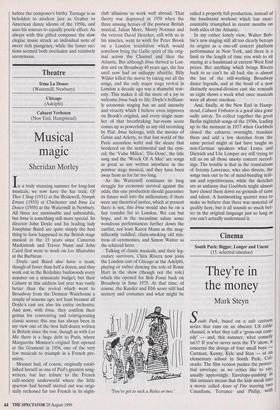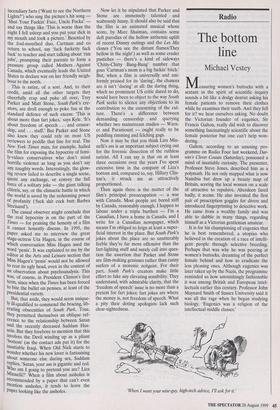Cinema
They're in the money
Mark Steyn
South Park, based on a cult cartoon series that runs on an obscure US cable channel, is what they call a 'gross-out com- edy' — and, this summer, what comedy isn't? If you've never seen the TV show, it concerns the doings of four small boys — Cartman, Kenny, Kyle and Stan — at all elementary school in South Park, Col- orado. The film version pushes the prover- bial envelope, as we critics like to say, usually approvingly. Envelope-pushing to this instance means that the kids sneak into a movie called Asses of Fire starring two Canadians, Terrance and Philip, with incendiary farts (Want to see the Northern Lights?') who sing the picture's hit song 'Shut Your Fuckin' Face, Uncle Fucka' and say things like 'This is worse than the night I fell asleep and you put your dick in my mouth and took a picture.' Besotted by the foul-mouthed duo, Cartman and co return to school, say 'fuck fucketty fuck fuck' to teacher and start talking about 'rim jobs', prompting their parents to form a pressure group called Mothers Against Canada, which eventually leads the United States to declare war on her friendly neigh- bour to the north.
This is satire, of a sort. And, to their credit, amid all the other targets they cheerfully crap and puke all over, Trey Parker and Matt Stone, South Park's cre- ators, are droll enough to poke fun at the standard defence of such excess: 'This is about more than fart jokes,' says Kyle. 'It's about freedom of speech . . . and censor- ship, and . . . stuff.' But Parker and Stone also knew they could rely on most US reviewers to peddle that line for real. The New York Times man, for example, hailed the film for exposing the hypocrisy of fami- ly-values conservatives who don't mind horrific violence as long as you don't say any naughty words. Interestingly, the glow- ing review failed to describe a single scene, quote any exchange, or convey the full force of a solitary joke — the giant talking clitoris, say, or the climactic battle in which the world is saved by the redeeming power of profanity (luck shit cock butt Barbra Streisand').
The casual observer might conclude that the real hypocrisy is on the part of the Times — for praising the honesty of a film it cannot honestly discuss. In 1995, the Paper asked me to interview the great stage-actress Uta Hagen, in the course of which conversation Miss Hagen used the word 'penis'. It was explained to me by the editor at the Arts and Leisure section that Miss Hagen's 'penis' would not be allowed to rear its ugly head, even in the context of an observation about psychoanalysis. This was, of course, in President Clinton's first term, since when the Times has been forced to bite the bullet on penises, at least of the presidential variety. But, that aside, they would seem unique- ly ill-qualified to commend the bracing, lib- erating obscenities of South Park. True, they permitted themselves an oblique ref- erence to the relationship between Satan and the recently deceased Saddam Hus- sein. But they forebore to mention that this 'involves the Devil winding up as a pliant bottom' (as the contact ads put it) for the insatiable Iraqi. When Old Nick starts to wonder whether his new lover is fantasising about someone else during sex, Saddam replies, 'Satan, your ass is gigantic and red. Who am I going to pretend you are? Liza Mirinclif?' When a film about assholes is recommended by a paper that can't even mention assholes, it tends to leave the Paper looking like the assholes. Now let it be stipulated that Parker and Stone are immensely talented and scabrously funny. It should also be said that the film is an animated musical whose score, by Marc Shaiman, contains some deft parodies of the hollow anthemic uplift of recent Disney outings and the Les Mis clones (`You see the distant flames/They bellow in the night') as well as some cruder pastiches — there's a kind of sideways `Chitty-Chitty Bang-Bang' number that goes 'Cartman's mom is a big fuckin' bitch.' But, when a film is universally and uni- formly praised for its 'daring', the chances are it isn't 'daring' at all: the daring thing, which no prominent US critic dared to do, would have been to object to the way South Park seeks to silence any objections to its contribution to the coarsening of the cul- ture. There's a difference between demanding censorship and querying whether two mainstream studios — Warn- er and Paramount — ought really to be peddling rimming and felching gags.
Now it may be that you think Liza Min- nelli's ass is an important subject crying out for the forensic dissection of the ruthless satirist. All I can say is that on at least three occasions over the years I've spent extensive time in the company of Liza's bottom and, compared to, say, Hillary Clin- ton's, it struck me as attractively proportioned.
Then again there is the matter of the film's principal preoccupation — a war with Canada. Most people are bored stiff by Canada, reasonably enough. 1 happen to labour under a triple burthen — I'm a Canadian, I have a home in Canada, and I write for a Canadian newspaper, which means I'm obliged to feign at least a super- ficial interest in the place. But South Park's jokes about the place are so unutterably feeble they're far more offensive than the fart-lighting stuff and surely call into ques- tion the assertion that Parker and Stone are film-making geniuses rather than canny surfers of a moronic zeitgeist. For their part, South Park's creators make little effort to fake any elevating sensibility. They understand, with admirable clarity, that the `freedom of speech' issue is no more than a pretext for fart jokes: fart jokes are where the money is, not freedom of speech. What a pity their doting apologists lack such clear-sightedness.



























































 Previous page
Previous page